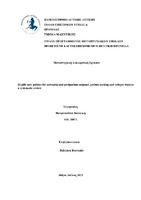Health care policies for antenatal and postpartum migrant, asylum-seeking and refugee women: a systematic review
Πολιτικές υγείας για τις μετανάστριες, αιτούντες άσυλο και πρόσφυγες γυναίκες κατά την προγεννητική και μεταγεννητική περίοδο: βιβλιογραφική ανασκόπηση

Μεταπτυχιακή διπλωματική εργασία
Author
Φουρτουνίδου, Βασιλική
Date
2023-06-21Advisor
Vivilaki, VictoriaKeywords
Migrant women ; Refugee women ; Irregular migrant women ; Asylum seekers ; Utilization and quality of care ; Perinatal healthcare ; Maternal and child healthcare ; Healthcare policies ; Healthcare access ; Healthcare recommendationsAbstract
Abstract
Background: The healthcare policies for migrant mothers is multidimensional and
complex issue. Women in perinatal period are vulnerable and need special care,
especially migrant pregnant women, since are associated with insufficient prenatal care,
financial difficulties, and higher stillbirths or infant death rates. Pregnant women
seeking asylum, refugees, or irregular migrants face many barriers to accessing health
care, including maternity. Timely access to perinatal care and other barriers needs to be
addressed by the health policies. Healthcare policies aimed at supporting antenatal and
postpartum refugee women are crucial for ensuring their well-being and the health of
their babies. These policies should address the unique needs and challenges faced by
refugee women during pregnancy, childbirth, and the postpartum period. It is important
to note that healthcare policies should be flexible, responsive, and regularly evaluated
to address the evolving needs and challenges faced by antenatal and postpartum refugee
women.
Aims: The purpose of this systematic review was to analyze both the barriers which
asylum-seeking, migrant and refugee women face during antenatal and postpartum
period, and the necessity of healthcare policies to that population.
Methods: Based on The Preferred Reporting Items for Systematic Reviews and Meta Analyses reporting guidelines (PRISMA, a systematic literature review was conducted
from 2009 until 2022 using the following databases: PubMed, MEDLINE, and Scopus.
Google Scholar is used to find relevant studies. Titles, abstracts and keywords of studies
identified in the search strategies were screened for inclusion criteria.
Results: A total of 16 articles were selected for inclusion. According to the literature,
several factors lead to refugee women delaying their search for medical services.
Among these factors are instances of racism encountered by refugees from healthcare
providers, linguistic barriers, difficulties in integrating into mainstream society, and
stress about adapting to host countries. Socioeconomic factors, cultural influences,
family status, language, and the quality of social networks can synergistically impact
both refugee women's health experiences and their maternal health. In the same time,
refugee crisis drives the governments to embrace austerity policies, which effect
refugee women’s health condition significantly. Moreover, healthcare policies intersect
with laws for migrants and refugees, implying that the health of undocumented women
depends on immigration policies. Here are some key healthcare policies that can be
implemented:
• Accessible and Culturally Competent Care: Ensure that antenatal and
postpartum healthcare services are accessible to refugee women. This includes
providing interpretation services, culturally competent care, and addressing
language barriers to facilitate effective communication between healthcare
providers and refugee women.
• Comprehensive Antenatal Care: Implement policies that promote early and
regular antenatal care for refugee women. This should include routine prenatal
check-ups, screenings, immunizations, and access to essential prenatal
vitamins and medications. Refugee women should be informed about the
importance of antenatal care and the available services.
• Mental Health Support: Recognize the increased risk of mental health issues
among refugee women during pregnancy and postpartum. Develop policies
that integrate mental health screenings, counselling services, and trauma informed care into antenatal and postpartum healthcare. Collaborate with
mental health professionals and community organizations to provide necessary
support.
• Health Education and Literacy: Develop policies that prioritize health
education for refugee women, including information on pregnancy, childbirth,
breastfeeding, nutrition, and infant care. This should be provided in a culturally
sensitive and language-appropriate manner, ensuring that refugee women have
access to accurate and understandable health information.
• Collaboration and Coordination: Encourage collaboration and coordination
between healthcare providers, refugee support organizations, and government
agencies to ensure a holistic approach to healthcare for antenatal and
postpartum refugee women.
Conclusions: Pregnant female migrants, asylum seekers, or irregular migrants face
more difficulties than the local population. Poor living conditions and nutrition,
difficult access to health facilities, and the lack of translators that make communication
with medical personnel more difficult affect the health of the pregnant woman during
pregnancy, increasing the complications and risks in pregnancy as well as maternal or
newborn mortality. These factors also affect the health of the mother and newborn after
delivery, increasing the risk of postpartum depression and complications. The above
barriers show how important healthcare policies are for migrant, asylum-seeking and
refugee women and the quality of taken health care.
Number of pages
40Faculty
Σχολή Επιστημών Υγείας & ΠρόνοιαςAcademic Department
Τμήμα ΜαιευτικήςPost-graduate Program
Προηγμένη και Τεκμηριωμένη Μαιευτική ΦροντίδαLanguage
English
Except where otherwise noted, this item's license is described as
Αναφορά Δημιουργού - Μη Εμπορική Χρήση - Παρόμοια Διανομή 4.0 Διεθνές
Αναφορά Δημιουργού - Μη Εμπορική Χρήση - Παρόμοια Διανομή 4.0 Διεθνές
Related items
Showing items related by title, author, creator and subject.
-
Οι σύγχρονες στρατηγικές διαπραγμάτευσης στην εποχή της ψηφιακής «έκρηξης» και των κρίσεων στον τομέα της υγείας
Μαραγκακη, Δροσούλα (Πανεπιστήμιο Δυτικής Αττικής, 2023-09-15)Εισαγωγή: Οι άνευ προηγουμένου προκλήσεις στον τομέα της υγείας και ο ταχύς ψηφιακός μετασχηματισμός, έχουν πυροδοτήσει αλλαγές στις στρατηγικές διαπραγμάτευσης. Η παρούσα βιβλιογραφική ανασκόπηση βασίζεται στην αναγνώριση ... -
Aνασκόπηση τελευταίων εξελίξεων και τάσεων στην διοίκηση μάνατζμεντ νοσοκομείων και εφαρμογές στην Ελλάδα
ΖΟΥΜΑΚΗ, ΕΥΑΓΓΕΛΙΑ (Πανεπιστήμιο Δυτικής Αττικής, 2024-03-15)Σκοπός: Η παρούσα διπλωματική εργασία εμβαθύνει στο management και στη διοίκηση της υγειονομικής περίθαλψης, με ιδιαίτερη έμφαση στο ελληνικό σύστημα υγειονομικής περίθαλψης, και συγκεκριμένα στο νοσοκομείο «Υγεία», ... -
Μοναχικότητα και τρίτη και ηλικία σε περίοδο πανδημίας COVID–19
Μαμζέρη, Αριστέα (Πανεπιστήμιο Δυτικής Αττικής, 2022-04-11)Η νόσος COVID-19 έχει απαράμιλλη παγκόσμια επίδραση, ιδιαίτερα στους ηλικιωμένους. Σκοπός αυτής της συστηματικής ανασκόπησης είναι να διερευνήσει την κοινωνική απομόνωση, τη μοναξιά και την ποιότητα ζωής των ηλικιωμένων ...

